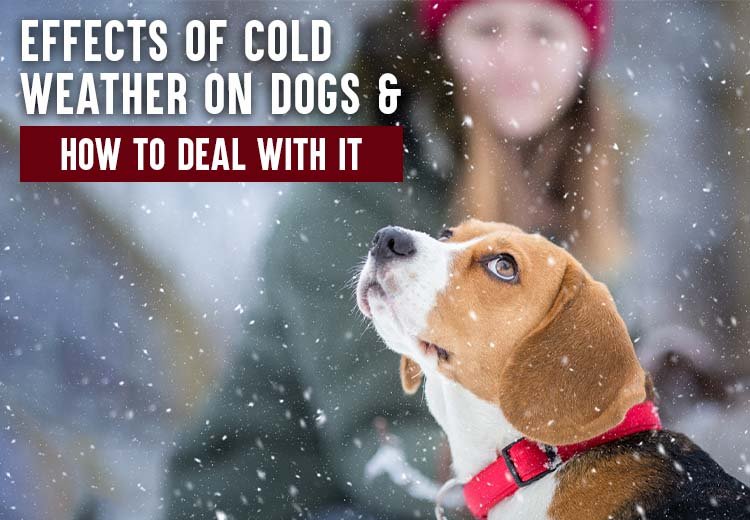Jan 04, 2024

Winter is back with all its magnificence. With chilly winds and snow all around, all you can think of is wrap yourself in a warm blanket and stay indoors as much as possible to avoid exposure to outside freezing temperatures. It is not just you then, because your furry companion would also be having similar requirements during colder times of the year. You may think that the fur coat of your dog is enough to give them warmth and can protect them from harsh weather, but that is not true. The general rule of thumb is if it is too cold for you, it is too cold for your pet. And if you help them stay warm, your beloved furry buddy can enjoy the winters without developing any serious health problems.
Take a look at some of the most common and severe effects of cold weather on dogs along with tips to deal with them:-
Hypothermia is a condition where your dog’s body temperature falls below the normal range. It results from your furry friend’s exposure to cold weather for an extended period, their wet fur, or due to windy conditions. Senior dogs or dogs with certain health conditions are more susceptible to hypothermia in cold weather. So if you find your furball shivering or their ears and feet are cold, cover them with a sweater or blanket to prevent hypothermia.
In extreme cold, the blood vessels of dogs divert blood towards the core to keep the vital organs warm. This leads to reduced blood flow towards the extremities like the ears, tails and paws leading to freezing of tissues under the skin. Walking on ice can damage your pooch’s paw pads and swimming in cold water during winter months can make their tail rigid. To save your furry pal from the suffering of frostbite, avoid taking them outside on days of extreme cold. If they have already been affected by the condition, consult a veterinarian immediately.
Dogs burn more calories during cold weather to maintain their body temperature. This leads to an increase in their food requirement. Adding nutrient-dense food to their diet that can provide your furry companion more energy will help them deal with cold. Also, keep a close watch on your furry buddy’s water intake. Dogs usually prefer to drink less water during winter, but their body’s hydration requirements remain unchanged. Make sure your pet drinks enough water to save them from dehydration.
Cold winds and low humidity make your pup’s skin and coat dry. Lack of nourishing natural oils leads to skin irritation and discomfort. Just like you apply skin lotion and lip balm to retain your skin moisture, applying moisturizing oil on your pet’s skin helps in maintaining their skin health. Adding omega-3 rich supplements to your furball’s diet is another good option for providing nourishment to their skin.
Cold and damp weather can lead to a drop in barometric pressure resulting in inflammation in joints. The movements of your beloved furry baby get slower due to joint stiffness. The effect is more severe on senior dogs or the ones suffering from arthritis. To help your dog cope with discomfort, add nutritious joint supplements to their diet that assist in keeping their joints healthy. Also, maintain the exercise routine of your pup to keep them active. On days of extreme cold, involve them in indoor games.
Check Dogs Joint Care Products At Lowest Price
When you take your furry buddy out for a walk on snowy days, the icy surface can make them slip and the fall can inflict injuries. Try rubber booties for your pooch that provide the necessary traction to walk without slipping. Also, the antifreeze and salt used to remove snow from the road are toxic for your pet. Make sure you wash your furball’s paws and abdomen with warm water after returning from the walk to remove the sweet-in-taste antifreeze and prevent the harm they can cause if licked.
Just like humans, dogs also depend on the thermoregulation system to maintain body temperature. Extremely cold weather can disturb this system and can lead to more than usual drop in your pet’s body temperature, which in turn can lead to lower heartbeat, low oxygen level, suppressed immune system and higher infection rate. To save your furry pal from trouble, use winter jackets, pet-safe heating pads and provide a cozy bed to keep them warm. The simplest way to keep your pet warm is to keep them active with exercise.
Dogs depend on their smelling sense to get an idea about their surroundings and directions. As the smells get covered up during winter due to the windy weather and snow all over the roads and sidewalks, your four-legged friend can get confused and may feel disoriented. It is best to keep them on a leash when outdoors during cold weather and restrict the walks to familiar paths.
Cold weather brings with it several challenges for you and your furry companion. Take care of their health during winter. Safeguard your pooch from the hazards of antifreeze intoxications and take measures to avoid unwanted accidents along with maintaining their routine exercise to keep them healthy, both mentally and physically.